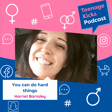
Ep. 93: The teenagers who campaign to make the world a better place with World Vision
This is a podcast that will change how you look at the problems you're going through. Carrie's voice is full of wisdom, and she knows what she's talking about, because she's been there too.
Carrie Grant, MBE, is a TV presenter, vocal coach, activist, and World Vision ambassador who has worked with the charity for over 10 years. She was awarded an MBE in 2020 “for services to music, to media and to charity”.
She partners with World Vision on the podcast series Raising Changemakers, where she hears from children who are making big changes in their global communities by campaigning to stop harmful practices like child labour, child marriage and FGM.
Carrie explains what teenagers can do if they're appalled by the state of the world. She also tells us about her own difficult experiences with Crohn's disease, a life-changing condition she had to learn to live with at a very young age.
She also talks about what it's like to raise neurodivergent children. Her book, A Very Modern Family, tells her family's story of neurodiversity.
More teenage parenting from Helen Wills:
Helen wills is a counsellor, a parent coach, and a teen mental health podcaster and blogger at Actually Mummy, a resource for midlife parents of teens.
Thank you for listening! Subscribe to the Teenage Kicks podcast to hear new episodes. If you have a suggestion for the podcast please email helen@actuallymummy.co.uk.
There are already stories from fabulous guests about difficult things that happened to them as teenagers - including losing a parent, becoming a young carer, and being hospitalised with mental health problems - and how they overcame things to move on with their lives.
You can find more from Helen Wills on parenting teenagers on Instagram and Twitter @iamhelenwills.
For information on your data privacy please visit Zencastr's policy page
Please note that Helen Wills is not a medical expert, and nothing in the podcast should be taken as medical advice. If you're worried about yourself or a teenager, please seek support from a medical professional.
Episode produced by Malloy Podcasts.



















